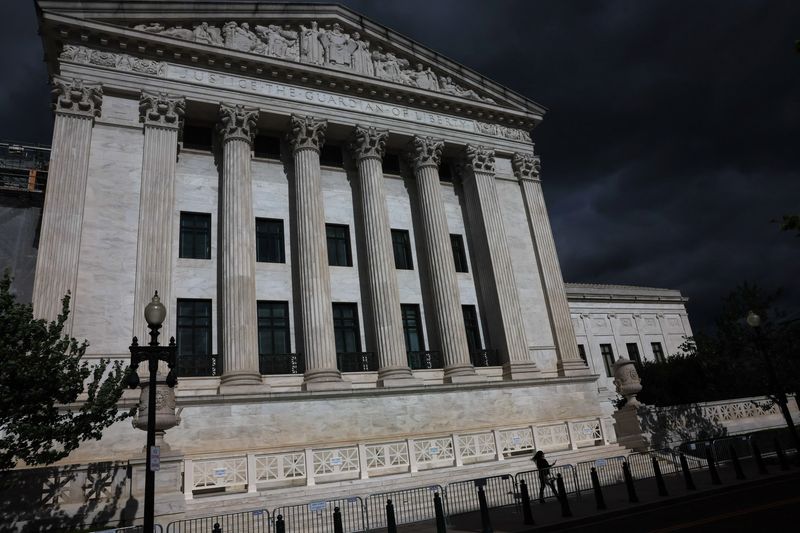By Andrew Goudsward
WASHINGTON (Reuters) -The U.S. Supreme Court's ruling on presidential immunity leaves Judge Tanya Chutkan to determine how much of the federal criminal case involving Donald Trump's efforts to overturn his defeat to Joe Biden in the 2020 election can survive.
The 6-3 ruling on Monday, with the court's conservatives in the majority, declared that Trump has broad protection from criminal prosecution for actions that fell within his official responsibilities as president under the U.S. Constitution.
The court delegated to Chutkan, a judge on the U.S. district court in Washington, the complex task of determining how to apply that immunity in the four-count criminal indictment obtained last year by Special Counsel Jack Smith. Chutkan will have to conduct a detailed examination of the indictment to determine which of Trump's actions were official and must be stricken from the case and which were private acts that can proceed to trial.
That process will make it nearly impossible for a jury to decide Trump's guilt or innocence before the Nov. 5 presidential election in which he is the Republican candidate challenging Biden, a Democrat. Trump has pleaded not guilty.
"It's probably one of the most challenging trial court responsibilities, certainly in my lifetime, that any district judge has been required to do," said Paul Grimm, a former federal judge who leads the Bolch Judicial Institute at Duke University School of Law. "It will be a roadmap for the future prosecution of the case."
Among the actions Chutkan must analyze are Trump's public statements to his supporters before their Jan. 6, 2021, attack on the U.S. Capitol, and his plan to organize alternative slates of electors pledged to vote for him in states he lost in order to thwart congressional certification of Biden's victory.
Chutkan must also decide whether prosecutors can overcome a presumption that Trump cannot be prosecuted for pressuring then-Vice President Mike Pence to derail congressional certification. The Supreme Court deemed those communications official acts.
"The immediate job that Judge Chutkan has is to clarify what can go to trial and what can't," said Jeremy Fogel, a former federal judge and executive director of the Berkeley Judicial Institute.
Trump would likely appeal her initial rulings, which could cause more delays.
Under the indictment, Trump was charged with conspiring to defraud the United States, corruptly obstructing an official proceeding and conspiring to do so, and conspiring against the right of Americans to vote.
The trial had been scheduled to begin in March but was delayed by the litigation over Trump's claim of immunity. Chutkan has previously promised to give Trump about 90 days to prepare for trial once the case returns to her courtroom, with a trial expected to last six to eight weeks.
If Trump wins, he could direct the U.S. Justice Department to end the case.
'SHE'S NO-NONSENSE'
Chutkan, born in Jamaica and nominated as a judge by Democratic former President Barack Obama, gained courtroom experience as a public defender representing people accused of murder and sexual assault. Chutkan has previously shown little patience for Trump's delay tactics and his attacks on the criminal justice system.
"The fact the defendant is engaged in a political campaign is not going to allow him any greater or lesser latitude than any defendant in a criminal case," Chutkan told Trump's lawyers during a hearing last year.
Even before Trump's case landed in her courtroom, Chutkan drew attention for giving some of the Capitol rioters harsher sentences even than those sought by prosecutors.
"She's intense. She's brilliant. She's no-nonsense," said Heather Shaner, a Washington criminal defense lawyer who has appeared before Chutkan. "She doesn't countenance fools."
Chutkan's remarks about the Capitol attack led to an unsuccessful effort by Trump's lawyers to remove her from the case. Trump last year called Chutkan biased and unfair.
Chutkan swiftly rejected Trump's argument that he could not face prosecution for official actions he took as president, writing in a December 2023 ruling that the U.S. presidency "does not confer a lifelong 'get-out-of-jail-free' pass."
But the Supreme Court found that the powers of the presidency require an expansive legal shield. Chutkan will have to apply those new guidelines in Trump's case.
Chutkan will also will need to determine the impact of a separate Supreme Court ruling last week that raised the legal bar for a federal obstruction charge against people involved in the Capitol attack. Two of the four counts against Trump were brought under the same law. Prosecutors previously indicated they intend to move ahead with those charges in his case.

It may be an uphill climb for Trump's lawyers. During a hearing last year, Trump attorney John Lauro credited Chutkan, saying she "hit the nail on the head" while making a point from the bench.
"That may be the last time you say that for a while," Chutkan responded, drawing laughs in the courtroom.